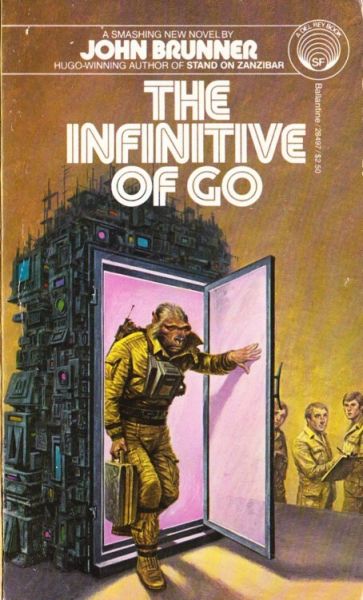Lost in the Fog
The Infinitive of Go
By John Brunner

21 Mar, 2021
John Brunner’s 1980’s The Infinitive of Go is a standalone science fiction novel.
Cold War paranoia provided the funds to finance Justin Williams and Cinnamon Wright’s revolutionary teleporter. The “poster,” as the device is innocuously dubbed, seems to work perfectly. Preliminary tests show that inanimate and animate payloads arrive intact.
The first long-range human test seems to have gone perfectly until courier George Gunther demands a countersign. Since no such countersign had been arranged, it cannot be given. Gunther immediately kills himself while destroying the documents he was conveying.
Something has clearly gone wrong, but what?
American oligarch turned ambitious politician T. Emory Chester funded the poster because he believed doing so would benefit his career. He is therefore irate that the poster somehow induced an agent to commit suicide. He does not care about the technical details involved, but he is very insistent that Justin and Cinnamon fix their flawed device.
In an attempt to grasp the issue from the inside, Justin undergoes a long-range transfer. As far as he can tell, his cognitive processes are utterly unaffected: no suicidal paranoia whatsoever! This is because the issue is not with the passenger, but the world around them. Justin finds himself stranded in a new universe. The poster does not simply move objects across the planet. It transfers them from universe to universe.
Discovering that he has landed in a parallel universe from which he can never return could be traumatic. Not entirely coincidentally, the universe in which he landed is in most ways superior to his original world. In this world, the Cold War does not dominate. In this world, Chester, having shed the shackles of heterosexuality, is a kind-hearted philanthropist. In this world, the attraction between Justin and Cinnamon is mutual.
The story would be happy if it ended there. The first emergency transfer from orbit delivers a person whose many differences from the original dispatched include the poster having been invented years earlier. Consequently, the odd-looking fellow is privy to much more information about the consequences of inventing the poster for its inventors. Said consequences are dire….
~oOo~
This is not the only SF novel I can recall in which a convenient long-range transportation device turns out to move objects from universe to universe… Thus my upcoming Tor essay.
There is a five-year hole in John Brunner’s SF bibliography. He had been a prolific author, publishing at least ten SF novels and at least four non-SF novels between 1970 and 1975 (including a number of the ambitious works on which his reputation rests). Then, between 1975’s The Shockwave Rider and this novel, he published nothing of novel length. The reason appears to be that he was working on an ambitious scheme to pull a John Jakes and vault over to the lucrative world of historical fiction. That effort resulted in 1983’s The Great Steamboat Race, which, alas, did not deliver riches.

A SF fan of forty-one years ago (such as this reviewer) probably thought: Brunner has returned! Huzzah! (I don’t remember thinking that, but I wouldhave thought that.)
Unfortunately, The Infinitive of Go isn’t a Stand on Zanzibar or a The Shockwave Rider. Go is a decidedly minor Brunner, in which the cursory plot involves a lot of angry shouting, and the characters are only a step above cardboard. It’s also a gadget story, of the sort for which he was known, but it’s limited in scope. He looks at the short-term, not the long-term consequences of using posters. He was good at this, but didn’t manage to do it in this too short novel.
A disappointingly minor work to mark Brunner’s return to SF. But at least he had returned to SF1.
The Infinitive of Gois available here (Amazon US), here (Amazon Canada), here (Amazon UK), here (Barnes & Noble), and here (Chapters-Indigo). It does not appear to be available from Book Depository.
1: He didn’t return to his previous profligacy with words (nor, I would say, his previous brilliance). Later SF works included:
Players at the Game of People(1980)
Manshape (1982)
The Crucible of Time(1983)
The Tides of Time(1984)
The Shift Key(1987)
Children of the Thunder(1989)
A Maze of Stars (1991)
Muddle Earth(1993)
Brunner died in 1995.
Both Threshold of Eternity (2017) and Kingdom of the Worlds (2021), both with Damien Broderick, were published (and I assume, finished by Broderik) posthumously. The Days of March (1988) was non-genre.
